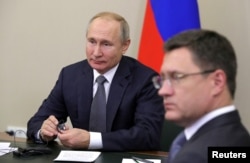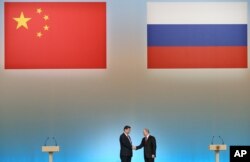Talks about the possibility of the United States (US) banning imports of crude oil from Russia has triggered a spike in the price of Brent crude oil to nearly $140 per barrel, the highest level since 2008.
Russia is the world’s largest exporter of crude oil and fuel, around 7 million barrels per day (bpd) or 7 percent of the world’s supply. The import ban, which has become an unprecedented discourse, has spurred prices that have already skyrocketed and risked inflationary shocks.
The following are some of the possible impacts as a consequence of the ban on imports of crude oil from Russia:
Price Soar
Western governments have not directly sanctioned Russia’s energy sector, but some consumers have distanced themselves from getting into legal trouble later.
JP Morgan estimates oil prices could hit a record $185 per barrel by the end of 2022 if the disruption to Russian exports lasts that long. Although most of the analysts and banks surveyed Reuters expect the annual average price to be under $100.
Russian Deputy Prime Minister Alexander Novak has also warned Western countries of the consequences of a ban on its oil exports. They, Novak said, would face the possibility of skyrocketing oil prices exceeding $300 per barrel as well as the closure of a major Russian-German gas pipeline if the government followed through on threats to cut energy supplies from Russia.
The last time oil prices hovered above $100 was in 2014 and the level reached on Monday (7/3) is not far from its high of over $147 in July 2008.
“A prolonged war causing widespread disruption to commodity supply could see Brent move above $150 a barrel,” said Giovanni Staunovo, commodities analyst at UBS.
Inflation
Natural gas prices hit an all-time high, causing energy costs to skyrocket. This will push inflation above 7 percent on both sides of the Atlantic in the coming months, eroding the purchasing power of households.
Apart from being a major supplier of oil and gas, Russia is also the world’s largest exporter of grains and fertilizers and a major producer of palladium, nickel, coal and steel. The exclusion of Moscow’s economic activities from the world trade system will hit various industries and add to global food security fears.
Inhibit Growth
The ban on Russian oil imports will further slow down the global recovery that has just recovered from the impact of the coronavirus pandemic.
Preliminary calculations by the European Central Bank (ECB) suggest that war could cut European economic growth by 0.3 to 0.4 percent this year in the base scenario and up to 1 percent if the war gets worse.
In the coming months, there is a high risk of stagflation, or small to minimal growth coupled with high inflation. Going forward, however, eurozone growth is likely to remain robust, even if commodity prices prove to be a drag.
In the US, the Fed estimates that each $10 per barrel increase in oil prices cuts growth by 0.1 percentage point, although the private sector predicts that the impact will be insignificant.
In Russia, the impact of inflation is expected to be significant. JPMorgan estimates that its economy will contract by 12.5 percent.
Impact on the Central Bank
For the US Federal Reserve, the impact of inflation has proven enormous and Federal Reserve Chair Jerome Powell said that interest rates would need to be raised this month, adding to pressure on borrowers.
For the ECB, the urgency of policy action is less acute as the labor market still enjoys spare capacity and there is little inflation growing at home.
Alternative Energy
Increasing consumption of fossil fuels after a severe slump during the pandemic, while energy supplies around the world are still limited, puts policymakers under pressure to increase supply even though they previously committed to supporting green energy.
The Russia-West standoff could strengthen Moscow’s ties with Beijing but the energy infrastructure between the two countries remains scant.
“Although Russia’s maneuvers to the East of Russia have accelerated gas cooperation with China through gas infrastructure, (but) all these developments are still in their infancy compared to the mature market in Europe,” said Kaho Yu, principal Asia analyst at risk consultancy Verisk Maplecroft.
Renewable energy could get a boost in the medium to long term as countries seek to disengage from Russian energy.
“We have to take the subsidies we’re currently pouring on natural gas, coal and petroleum and put them into renewable energy generation, electric mobility and electric car charging infrastructure, heat pumps, building efficiency improvements,” said Wolfgang Ketter, professor at Rotterdam. School of Management at Erasmus University in the Netherlands. [ah/rs]





